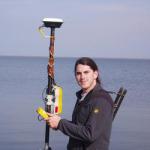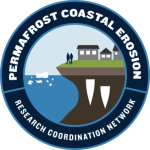Coordinate a Transdisciplinary Research Network to Identify Challenges of and Solutions to Permafrost Coastal Erosion and Its Socioecological Impacts in the Arctic
The Permafrost Coastal Erosion-RCN (PCE-RCN) will bring together leaders in fields of natural and social science and engineering to address the challenges faced by coastal communities in the Arctic due to rapid coastal erosion. Rapid coastal erosion can force communities to consider moving inland and limit access to resources. One goal of the proposed PCE-RCN will be to better understand the challenges associated with coastal erosion, which is driven by permafrost thaw and changing sea ice conditions. Another goal is to identify potential solutions and their socio-ecological impacts. These goals will be addressed through a series of international workshops, publications and direct interaction with local media. Engagement with regional and local resource managers and communities will be incorporated throughout many of the activities of the PCE-RCN. This project promotes convergence by focusing on a topic of high societal concern, coastal erosion in the Arctic, and by approaching this topic in a manner that will integrate diverse fields, including social science and natural science disciplines (coastal geophysics, soil physics, climate modeling, and atmospheric science) and disciplines in civil and environmental engineering.
The proposed Permafrost Coastal Erosion-RCN (PCE-RCN) will bring together national and international leaders in the diverse scientific and engineering disciplines needed to address the pressing societal issue of rapid coastal erosion. Rapid coastal erosion is underway throughout the Arctic, and is impacting coastal communities in profound ways, including displacement and loss of livelihood. The goal of the proposed PCE-RCN will be to further resolve through synthesis activities how coastal erosion is driven by permafrost thaw and changing sea ice conditions and to identify potential solutions and their socio-ecological impacts. These goals will be addressed through a series of workshops and meetings with researchers, local community members, industry partners, and government agencies, two special issues in journal publications, and other outlets. Engagement with regional and local resource managers and communities will be incorporated throughout many of the activities of the PCE-RCN.
The goal of this project is to establish a transdisciplinary Permafrost Coastal Erosion Research Coordination Network (PCE-RCN) to identify challenges of and solutions to Arctic permafrost coastal erosion as well as its socioecological impacts by converging civil and coastal engineering, social sciences, and permafrost and climate sciences. Beginning in the summer of 2018, this four-year project will hold annual meetings/workshops to bring additional researchers, practitioners, policy makers, and Alaskan local community representatives to the RCN, so that the challenges can be better understood and appropriately addressed in a broad scheme. No fieldwork is associated with this project.
Principal Investigators
Resources
Permafrost Coastal Erosion Research Coordination Network (PCE-RCN)
The Permafrost Coastal Erosion Research Coordination Network (PCE-RCN) is established to identify challenges of and solutions to Arctic coastal permafrost erosion as well as its socioecological impacts by converging natural sciences, social sciences, and engineering. The project is funded by the Office of Polar Programs of the National Science Foundation.
Transforming permafrost coastal systems: Advancing scientific discovery through international collaboration
In the Alaskan Arctic, permafrost coastal systems are eroding at rates more than double those of the past. Rampant environmental change is putting new pressures on Arctic coastal dynamics, with the loss of landscapes, cultural heritage, infrastructure, and communities.
Publications
Liew, M., M. Xiao, L. Farquharson, D. Nicolsky, A. Jensen, V. Romanovsky, J. Peirce, L. Alessa, C. McComb, X. Zhang, and B. Jones, 2022: Understanding Effects of Permafrost Degradation and Coastal Erosion on Civil Infrastructure in Arctic Coastal Villages: A Community Survey and Knowledge Co-Production, Journal of Marine Science and Engineering, 10(3), https://doi.org/10.3390/jmse10030422.
Chi, G., S. Zhou, M. Mucioki, J. Miller, E. Korkut, L. Howe, J. Yin, D. Holen, H. Randell, A. Akyildiz, K.E. Halvorsen, L. Fowler, J.Ford, James and A.Tickamyer, 2024: Climate impacts on migration in the Arctic North America: existing evidence and research recommendations, Regional Environmental Change, 24, https://doi.org/10.1007/s10113-024-02212-9
Project Outcomes
The Permafrost Coastal Erosion-Research Coordination Network (PCE-RCN) brought together leaders in fields of natural and social science and engineering to address the challenges faced by coastal communities in the Arctic due to rapid coastal erosion. Rapid coastal erosion can force communities to consider moving inland and limit access to resources. One goal of the project was to better understand the challenges associated with coastal erosion, which is driven by permafrost thaw, storms, and changing sea ice conditions. Another goal was to identify potential solutions and their socio-ecological impacts. These goals were addressed through a series of international workshops, publications and direct interaction with local media. Engagement with regional and local resource managers and communities were incorporated throughout many of the activities of the PCE-RCN. This project promoted convergence by focusing on a topic of high societal concern, coastal erosion in the Arctic, and by approaching this topic in a manner that integrated diverse fields, including social science (demography, sociology, and anthropology) and natural science disciplines (coastal geophysics, soil physics, climate modelling, remote sensing, and atmospheric science) and disciplines in civil and environmental engineering.
The PCE-RCN project organized two workshops: 2018 Workshop on Permafrost Coastal Erosion–Research Coordination Network in Fairbanks, Alaska and the 2023 Arctic Coasts Workshop in Boulder, Colorado. The PCE-RCN project coordinated two journal special issues: Special Publication Issue “Observations, Interactions, and Implications of Increasingly Dynamic Permafrost Coastal” in Frontiers in Earth Science, section Cryospheric Sciences; Special Publication Issue “Modeling of Arctic Coastal Hazards and Risks” in Journal of Marine Science and Engineering.






